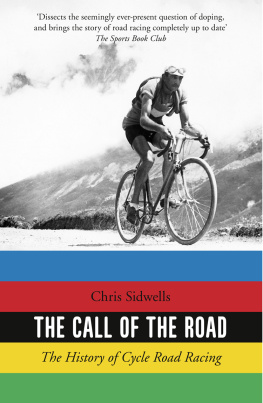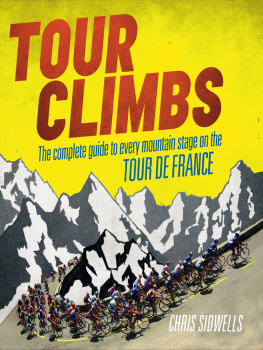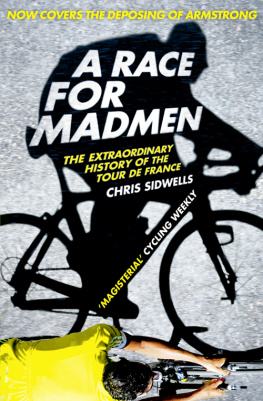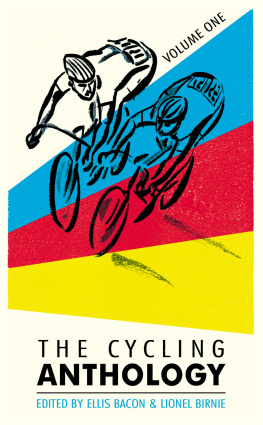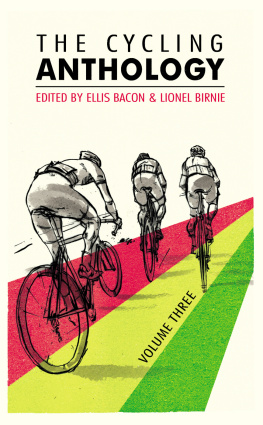Sidwells Chris - The Art of the Cycling Jersey
Here you can read online Sidwells Chris - The Art of the Cycling Jersey full text of the book (entire story) in english for free. Download pdf and epub, get meaning, cover and reviews about this ebook. year: 2017, publisher: Rodale Inc, genre: Detective and thriller. Description of the work, (preface) as well as reviews are available. Best literature library LitArk.com created for fans of good reading and offers a wide selection of genres:
Romance novel
Science fiction
Adventure
Detective
Science
History
Home and family
Prose
Art
Politics
Computer
Non-fiction
Religion
Business
Children
Humor
Choose a favorite category and find really read worthwhile books. Enjoy immersion in the world of imagination, feel the emotions of the characters or learn something new for yourself, make an fascinating discovery.

- Book:The Art of the Cycling Jersey
- Author:
- Publisher:Rodale Inc
- Genre:
- Year:2017
- Rating:4 / 5
- Favourites:Add to favourites
- Your mark:
- 80
- 1
- 2
- 3
- 4
- 5
The Art of the Cycling Jersey: summary, description and annotation
We offer to read an annotation, description, summary or preface (depends on what the author of the book "The Art of the Cycling Jersey" wrote himself). If you haven't found the necessary information about the book — write in the comments, we will try to find it.
The Art of the Cycling Jersey — read online for free the complete book (whole text) full work
Below is the text of the book, divided by pages. System saving the place of the last page read, allows you to conveniently read the book "The Art of the Cycling Jersey" online for free, without having to search again every time where you left off. Put a bookmark, and you can go to the page where you finished reading at any time.
Font size:
Interval:
Bookmark:


Mention of specific companies, organizations, or authorities in this book does not imply endorsement by the author or publisher, nor does mention of specific companies, organizations, or authorities imply that they endorse this book, its author, or the publisher. Internet addresses and telephone numbers given in this book were accurate at the time it went to press.
2017 Quid Publishing
All rights reserved. No part of this publication may be reproduced or transmitted in any form or by any means, electronic or mechanical, including photocopying, recording, or any other information storage and retrieval system, without the written permission of the publisher.
Bicycling is a registered trademark of Rodale Inc.
Book design by Lindsey Johns
Library of Congress Cataloging-in-Publication Data is on file with publisher.
ISBN 9781623367374 hardcover
ISBN 9781623367381 e-book

We inspire health, healing, happiness, and love in the world. Starting with you.
RodaleWellness.com





A lithographic print produced in Detroit in 1895, at a time when cycling as a spectator sport was rapidly gaining popularity.
The bicycle and the body of the bicyclist are the two most essential components of the quality that might be considered something as simple as style but could also be described as presence, state, or even haecceity. Im talking about that specific rider-ness each of us has, which comes from or creates (or, probably, both) how we sit a bike, how we pedal, how much and in which ways we lean ourselves and our bicycles through corners, how we hold the bike, how we balance it beside us as we walk, how we handle it as we hang it on a hook or push it through a door or shoulder it up a staircaseany time we are in communion with our bicycle.
Of the rest of the elements that make us us, I put the cycling jersey an easy third to bike and body. Whats more, in terms of range of expressiveness, I put it first. The jersey! The most dominant value of the cycling aesthetic, and one of its simplest components, yet also the one most laden with subtext and potential ironies and sincerities and affiliations and memories and references often unknown to the wearer. A jersey can be a nod to a team, a racer, an era, a fabric, a design sense, a remembrance, a personal experience, an aspiration, or else simply come in a color we really really like and that happened to be in our size. One can, for instance, wear and cherish a Molteni jersey for the distinct and odd color, without knowing anything about Eddy Merckx; or, if one knows Merckx, remaining ignorant of the grand loyal domestique Jos Huysmans; or, fully immersed in racing history, forget that Molteni was a sausage factory and lose out on the delicious pleasure of that contradiction. And how to even begin comprehending the Brooklyn jersey, the vestment of an Italian chewing gum company in an All-American design, and best and most nobly worn by a Belgian known as Monsieur ParisRoubaix for his otherworldly career record in a quintessentially Flandrian race that never leaves France. (It is said that Roger De Vlaeminck never suffered a flat tire on the cobbles until he forsook the Brooklyn jersey late in his career.)
So it is that a jersey influences how others regard you, from the simplest observations (how pretty), to philosophical judgments that may be far beyond your own ken. But the jersey also influences its rider, I believe. It tells us who we are on a bike and who we might be and who we dont care to be, and it helps us get to whichever of those destinations it is that we have chosen to prize, and it helps us, as well, get what we need to arrive there. This volume is a wonderland for those who appreciate all that, and a door to that world for those who dont yet, but might.
Bill Strickland
Editor-in-chief, Bicycling magazine
July, 2016
This book traces the development of the cycling jersey from the jackets and woolen pullovers worn by early racers, to the sophisticated designs and materials that make up the very latest cycling jerseys today. It tells the story of the jerseys awarded to champions, and those that denote the leaders of the various competitions of the Grand Toursthe Tour de France, Giro dItalia, and Vuelta a Espaa. These jerseys are iconic, but so are those of the professional teams that the best riders in the history of cycling have raced for.

The French national team pictured at the 1932 Tour de France. From left to right: Andr Leducq, Albert Barthlmy, Julien Momeau, Louis Peglion, Marcel Bidot, Maurice Archambaud, Georges Speicher, and Roger Lapbie.
The most iconic cycling jerseys possess a mystique and a beauty that is a distillation of their design and the part they played in the sport. Professional teams have a very important place in the story of the cycling jersey, as do the riders, and The Art of the Cycling Jersey reveals facts about some of the famous, and not so famous, characters who have brought fame and glory to their jerseysfrom the Bianchi team jersey worn by Fausto Coppi, the Molteni of Eddy Merckx, and the St. Raphal of Jacques Anquetil to the Tebag of Ferdi Kbler and the EMI of Charly Gaul.
From the maiden Mapei, and ONCE. There is also a separate chapter dedicated to the story of the six-day jersey. An offshoot of mainstream cycling, six-day races have a long and fascinating history, and they have jersey traditions of their own. The stories of these and many more jerseys are told in this book.
But this book is not just a celebration of iconicity. It explains the ways in which cycling jerseys have developed over the years. As professional cycling changed, so did the type of businesses that sponsored the teams, and those businesses have been responsible for jersey designs, because they want something that best reflects their brand.
Finally, this book reflects the broad-brushstrokes history of Europe from around the turn of the 20th century, through two World Wars, and up to the present day. For example, when Europe went through the interwar years of rampant nationalism, so the Tour de France switched from trade-sponsored to national teams with national team jerseys. Then after the Second World War, as the continent grew more affluent, the sponsorship of cycling teams changed from bicycle manufacturers to a wider range of businesses.
Font size:
Interval:
Bookmark:
Similar books «The Art of the Cycling Jersey»
Look at similar books to The Art of the Cycling Jersey. We have selected literature similar in name and meaning in the hope of providing readers with more options to find new, interesting, not yet read works.
Discussion, reviews of the book The Art of the Cycling Jersey and just readers' own opinions. Leave your comments, write what you think about the work, its meaning or the main characters. Specify what exactly you liked and what you didn't like, and why you think so.


